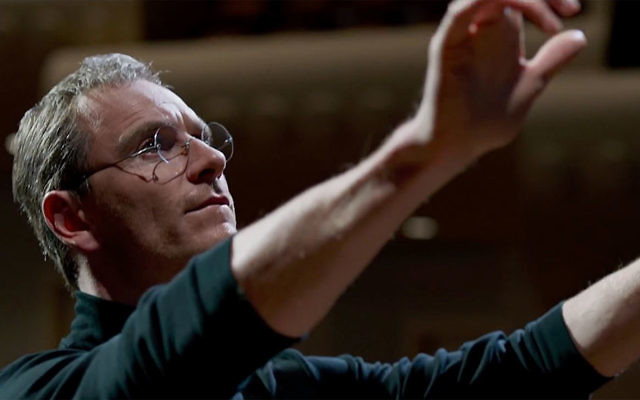Brilliant life of Steve Jobs
A new film on visionary Apple co-founder Steve Jobs focuses on three technology launches in 1984, 1988 and 1998 to give an insight into the charismatic man. See film critic Don Perlgut’s review.
FILM REVIEW of Steve Jobs by Don Perlgut. Rating: 4 stars.
When Apple tops the world’s list of companies by market valuation, it is natural to be fascinated by the new film Steve Jobs about its visionary co-founder.
It also helps that Jobs (played by Michael Fassbender) was larger than life, a major presence in the both corporate and technology worlds over three decades, far outclassing his brilliant but less confident Apple co-founder Steve Wozniak (Seth Rogen).
With Steve Jobs, Jewish screenwriter Aaron Sorkin (The West Wing) establishes his primacy as the top screen “interpreter” of technology company founders, following his Oscar-winning screenplay of The Social Network, about the early days of Facebook and Mark Zuckerberg.
Despite the direction of Danny Boyle (Slumdog Millionaire), Sorkin “owns” the creative force of Steve Jobs in a way that few screenwriters can do.
Like The Social Network, some of the facts and many of the interpretations in Steve Jobs are disputed by those who were close to the action.
Sorkin originally developed his dramatic flair with stage plays and Steve Jobs could easily be one of them. It runs on a three-act structure, with each “act” centred on a technology launch by Jobs: the Macintosh in 1984, the NEXT Cube in 1988 and finally the iMac in 1998.
The film includes flashbacks and scene-setting documentary footage, including the famous 1984 Super Bowl advertisement for the Macintosh computer, but most of Steve Jobs takes place within the buildings where the three launches took place.
At each launch, six real-life characters from Jobs’ life seek him out, all stating their case of what they want from him, ranging from money and recognition to love and acceptance.
Psychologically vulnerable former girlfriend Chrisann Brennan (Katherine Waterston) wants a reluctant Steve to acknowledge the existence of their daughter, Lisa (played by different actresses at ages 5, 9 and 19), as well as money to live on.
Young Lisa simply wants a father figure, which Jobs churlishly refuses to be.
Apple’s head of marketing, Russian-born Jewish Joanna Hoffman (Kate Winslet) is the one employee who can stand up to Jobs’ bullying, and acts as his personal and professional conscience. Much is made of Hoffman’s “shtetl” upbringing.
Apple co-founder Wozniak wants Jobs simply to recognise the contributions of his Apple 2 design team, something that Jobs steadfastly and boorishly refuses to do.
Apple CEO John Scully (Jeff Daniels) wants Jobs to behave properly with his board of directors. And lead Apple designer Andy Hertzfeld (Jewish actor Michael Stuhlbarg) just wants Jobs to treat him like a human being, not a cog in a machine.
Did all of these characters interact with Jobs at each launch? No. But Sorkin’s dramatic licence allows the film to show how all of these intimates developed their relationships with Jobs over time. It’s a classic technique, brilliantly executed.
The result is a wordy and at times claustrophobic film, which may not be to everyone’s taste. The personality of Jobs that emerges – a supremely confident, charismatic, controlling and not very nice man – can also make the film difficult to watch.
In addition to Sorkin’s fine screenplay, however, the performances are all strong and frequently riveting, with Fassbender and Winslet (both Oscar-nominated) standing out.
Steve Jobs is currently screening.


comments